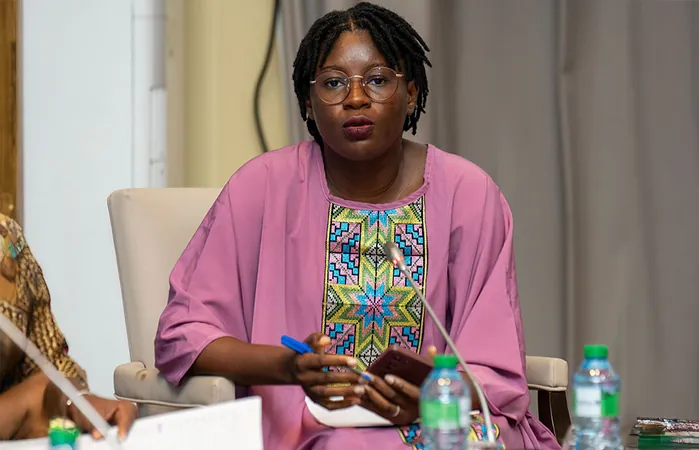
Rising Up: Togo’s Youth Take Charge in the Fight Against HIV
2024-10-31
Author: Li
Introduction
In Togo, a powerful wave of youth determination is reshaping the landscape of the country’s response to the HIV epidemic. A new grassroots initiative known as the Network of Positive Children, Adolescents and Youth Innovating for Renewal (REAJIR+) has emerged, bringing together young individuals living with HIV to amplify their voices and advocate for their rights. This network stands as a prime example of how youth leadership can redefine the future in times of adversity.
The Motivation Behind REAJIR+
"We recognized a critical need for a platform where young people living with HIV could express their concerns and aspirations," shares Sitsope Adjovi Husunukpe, Executive Director and founding member of REAJIR+. “Many of us felt sidelined in the conversations surrounding HIV policies and care. Our experiences mattered and deserved recognition.”
Challenges Faced
However, forming this network was fraught with challenges. Togo’s leadership has historically been dominated by adults, and the shift to a youth-led initiative required immense courage. “Though the path was riddled with obstacles, we were steadfast in our vision,” Adjovi explains. “Even when faced with skepticism, we knew we had to continue. Our goal was to create a safe space for youth to advocate for themselves.”
The Urgency for Youth Involvement
The urgency for youth involvement in the HIV response cannot be understated. Recent studies highlight a troubling statistic: only 26% of youths aged 15-24 possess adequate knowledge about HIV prevention. Furthermore, adherence to HIV treatment among children is alarmingly low, with stats showing that only 80.5% are compliant with their regimens. Alarmingly, approximately 6,200 children aged 0 to 14 are currently living with HIV, and in Western and Central Africa, up to 16% of girls and 12% of boys have initiated sexual activity before reaching 15 years of age. Such figures underscore the necessity for educational and health initiatives targeting these vulnerable groups.
Empowerment as a Catalyst for Change
"Empowering young people signifies more than mere awareness; it’s about harnessing their potential to instigate change," asserts Dr. Yayé Kanny Diallo, UNAIDS Country Director for Togo and Benin. "When youth own their advocacy, they become the catalysts for progress, formulating solutions grounded in their first-hand experiences."
Building Credibility and Authority
Koffi Emmanuel Hounsime, the president of the REAJIR+ network, underscores the importance of recognition in the movement. "Initially, our legitimacy was questioned—people doubted who we were representing," he reflects. "But as we formalized our group and established credibility, respect followed. Now we speak with authority for youth living with HIV across Togo."
Looking Ahead
Despite ongoing challenges, the network remains unwavering in its mission. "Our fight extends beyond ourselves; it is for future generations of young people living with HIV," asserts Adjovi. "We strive for improved support and healthcare, ensuring we can make informed decisions about our health."
The Impact of REAJIR+
The impact of REAJIR+ has already been profound. The network has actively engaged in national HIV dialogues and influenced the creation of a new Global Fund HIV grant, ensuring that the voices of adolescents and young individuals are prioritized in funding and programs.
A Dream of Transformation
For these trailblazing young leaders, establishing the network transcends mere advocacy; it embodies resilience, empowerment, and hope. Emmanuel poignantly states, "We didn't just form this network to represent young people; we did it to transform lives. Every day, we strive to ensure that no young individual living with HIV feels isolated in their struggle."
Conclusion
As this vibrant network continues to grow, it’s clear that the youth of Togo are not only standing up for their rights but are also paving the way for a healthier, more inclusive future.

 Brasil (PT)
Brasil (PT)
 Canada (EN)
Canada (EN)
 Chile (ES)
Chile (ES)
 España (ES)
España (ES)
 France (FR)
France (FR)
 Hong Kong (EN)
Hong Kong (EN)
 Italia (IT)
Italia (IT)
 日本 (JA)
日本 (JA)
 Magyarország (HU)
Magyarország (HU)
 Norge (NO)
Norge (NO)
 Polska (PL)
Polska (PL)
 Schweiz (DE)
Schweiz (DE)
 Singapore (EN)
Singapore (EN)
 Sverige (SV)
Sverige (SV)
 Suomi (FI)
Suomi (FI)
 Türkiye (TR)
Türkiye (TR)